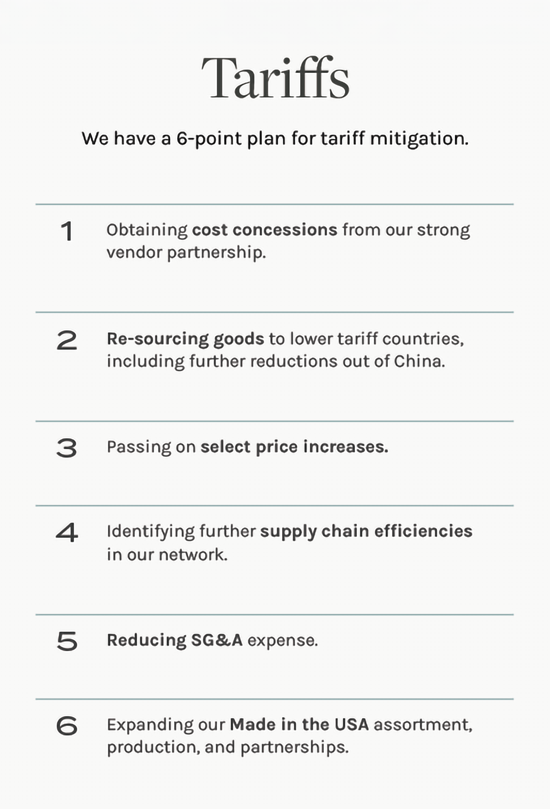By Gary Aiken | May 8, 2025
The tariff announcements on Liberation Day were bigger and bolder than anything Wall Street had imagined. Since then, I’ve cataloged the desperate rationalization of bad policy. Some ascribe goals post-hoc to the tariffs, and others to justify the base illiteracy of the initial tariff schedule. We must recognize that tariffs are a new, semi-permanent reality. Pro-tariff arguments fall into two categories: geopolitical and domestic.
The geopolitical arguments revolve around using tariffs, mostly against China.
- We must change trade patterns because countries are “ripping us off.”
- Tariffs are a negotiating ploy, and China will cave first.
- Tariffs will align our trading partners against China.
The trade imbalances that have arisen since China’s entry into the WTO have become quite enormous. China is a bad actor. They steal technology, dump cheap goods, hide spyware in products, and use near-slave labor and dangerous chemicals in production, among other nasty habits. Further, the Chinese have been using their economic and military power to encroach upon our allies in Southeast Asia and around the world. Confronting China has been a growing and bi-partisan theme and effort in the United States. Convincing our friends and partners to join us has been difficult as Europe has grown increasingly dependent on China.
Tariffs on Chinese imports will have a serious and detrimental effect on trade and costs. We are already seeing slowdowns in our West Coast ports and trucking demand. While companies (like Apple and Williams-Sonoma, to name two in our portfolios) have been diversifying their supply chains, China remains a large part of the global supply chain, and it will be difficult and costly to extricate. The Trump Administration seems willing to help companies with significant political influence on a case-by-case basis. Still, the determination to change Chinese behavior seems like it will be with us for some longer period.
That said, what are the key takeaways from the geopolitical arguments?
- We should expect that the cost of goods in the Chinese supply chain will rise significantly, and those prices will be reflected in lower gross margins and higher prices for the consumer.
- Investment in diversifying supply chains will accelerate – whether it’s to friendshoring, nearshoring, or onshoring.
Let’s move on to the second argument: Tariffs will be good for the domestic economy.
- Tariffs will raise revenue, and that will allow us to cut taxes.
- Tariffs won’t be inflationary.
- Companies will adjust to tariffs; there won’t be any serious consequences.
- We are “Volckering ourselves.” Tanking the economy to lower interest rates and lower interest rates are necessary.
I think the argument that the Smoot Hawley tariffs were the cause of the Great Depression is overwrought. There’s greater evidence that other factors were more significant — especially the intransigence of the Federal Reserve (I’d point our readers to the book Lords of Finance by Liaquat Ahamed for a thorough case). Tariffs will raise revenue, although that revenue will be offset by lower economic activity overall. Lower economic activity means lower tax revenues and, in today’s situation, greater fiscal deficits. While fiscal deficits aren’t inflationary all by themselves, they certainly won’t lead to lower interest rates or less inflation.
Companies in the supply chain of tariffs will be forced to make choices about how to deal with the increased cost of goods. There are only so many ways to squeeze a balloon without it popping. Retailers report earnings at the end of earnings season, and some were forthcoming about how they would deal with tariffs. Williams-Sonoma gave us a six-point plan that isn’t revolutionary but revelatory and likely representative of the conversations in every company’s top management.

Source: Williams-Sonoma, Inc. 2025 Investor Presentation, March 19, 2025
As for the final point about “Volckering” ourselves. Inducing a recession is a dicey proposition. Fed Chair Volcker did it with the blessing of Presidents Carter and Reagan. Inflation was running double digits, and a jarring of the economy was necessary. Today, inflation is running at 3% and unemployment at 4.2%. It seems hardly necessary to induce a recession to bring rates down from 4.5% to potentially 3.5%. Also, having a recession while the federal deficit is already near 6% of GDP seems more likely to raise suspicion that the Federal Debt is out of control and that long-term interest rates should rise significantly to compensate for dubious policy goals.
The key takeaways from the domestic arguments are:
- Tariff revenues will likely come in lower than expected, as tariffs tend to reduce overall economic activity and may lead to a decline in general tax revenue. Without spending cuts, deficits will grow larger.
- Inducing recession fears to provoke a central bank response is unlikely to work and could backfire if a recession materializes.
We do not have a crystal ball, but we do have the ability to assign probabilities to various scenarios. At the beginning of 2025, we told clients to prepare for greater volatility as this year would likely be a grind. April brought showers of volatility from the Liberation Day tariff announcements. May flowers might sprout in the form of deals to ameliorate the markets’ fears.
Author

Gary Aiken, Chief Investment Officer
Gary Aiken is the Chief Investment Officer for Concord Asset Management and is responsible for macroeconomic analysis, asset allocation, and security selection, as well as trading and investment operations.
Gary has over 21 years of investment experience and holds an undergraduate degree in economics from the University of Maryland and an MBA from The George Washington University School of Business.
—
Please remember that past performance may not be indicative of future results. Different types of investments involve varying degrees of risk, and there can be no assurance that the future performance of any specific investment, investment strategy, or product (including the investments and/or investment strategies recommended or undertaken by Concord Asset Management, or any non-investment related content, made reference to directly or indirectly in this article will be profitable, equal any corresponding indicated historical performance level(s), be suitable for your portfolio or individual situation, or prove successful. Due to various factors, including changing market conditions and/or applicable laws, the content may no longer be reflective of current opinions or positions. Moreover, you should not assume that any discussion or information contained in this article serves as the receipt of, or as a substitute for, personalized investment advice from Concord Asset Management. To the extent that a reader has any questions regarding the applicability of any specific issue discussed above to his/her individual situation, he/she is encouraged to consult with the professional advisor of his/her choosing. Concord Asset Management is neither a law firm, nor a certified public accounting firm, and no portion of this content should be construed as legal or accounting advice. A copy of Concord Asset Management’ current written disclosure Brochure discussing our advisory services and fees is available upon request or at www.concordassetmgmt.com. Please Note: If you are a Concord Asset Management or Concord Wealth Partners client, please remember to contact the firm in writing, if there are any changes in your personal/financial situation or investment objectives for the purpose of reviewing, evaluating, and/or revising our previous recommendations and/or services, or if you would like to impose, add, or to modify any reasonable restrictions to our investment advisory services. Concord Asset Management and Concord Wealth Partners shall continue to rely on the accuracy of information that you have provided. Please Note: If you are a Concord Asset Management or Concord Wealth Partners client, please advise us if you have not been receiving account statements (at least quarterly) from the account custodian.
